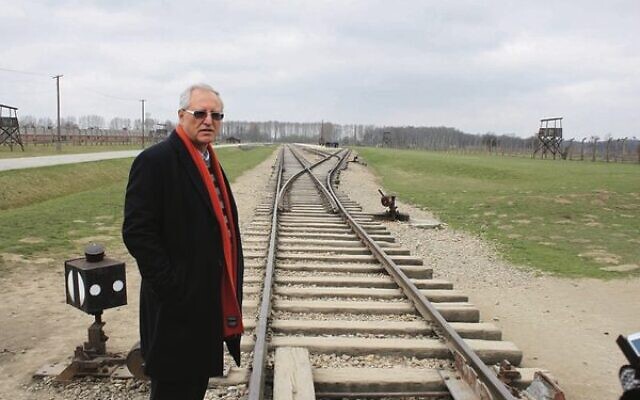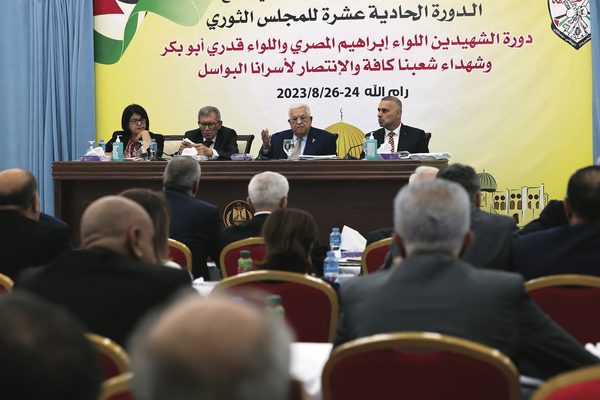Holocaust denial in Palestinian society
Palestinian professor Mohammed Dajani, who took his students to Auschwitz, tells Gianluca Pacchiani that distortion of Nazi atrocities is deeply tied to Palestinian narrative and built on lack of education.

(TIMES OF ISRAEL) – Palestinian peace activist Professor Mohammed Dajani saw his academic career brought to a halt after he taught Palestinian students about the Holocaust from a Jewish perspective.
In March 2014, he led a delegation of 30 students to the Nazi concentration and extermination camp in Auschwitz, guided by two Jewish Holocaust survivors, on a trip he said was aimed at teaching “empathy and tolerance”.
Recalling the impact of his educational trip to the Nazi death camp, Dajani tells The Times of Israel, “The views of Palestinian students changed after they visited Auschwitz. They realised they had nothing to fear from opening their eyes to these chapters of tragic human history.

“At school, Palestinians learn, ‘The enemy of my enemy is my friend’; at Auschwitz, they learned, ‘The enemy of my enemy is not necessarily my friend.’ They learned that psychopaths and criminal minds did not commit the Nazi cruelties and atrocities. The perpetrators were just ordinary people.”
But following the trip, the professor of political science was forced to resign from his teaching position at Al-Quds University in east Jerusalem, where he was the founding director of the American Studies Institute and one of the very few Palestinian educators to teach about the Shoah. He did so after pressure and threats from his university.
“There was strong opposition to taking students to Auschwitz since the knowledge they may acquire would contradict the collective narrative. Some thought the Holocaust was a Zionist narrative to gain international support for Israel,” Dajani recollects.
“Breaking taboos and walking away from the crowd is usually vehemently opposed by the community. In hoping to break this taboo, I wanted to leave the door open for social change, reconciliation and peace.”
Palestinian attitudes toward the Holocaust have been under scrutiny again after Palestinian Authority President Mahmoud Abbas, in a speech at a recent Fatah gathering that caused widespread international uproar, claimed that Adolf Hitler persecuted the Jews not because of their race and religion but due to their “social role”, which “had to do with usury, money and so on and so forth”.
Abbas also repeated a debunked theory that Ashkenazi Jews are not descended from ancient Israelites but from a Turkish people known as the Khazars who converted to Judaism en masse.

“Antisemitism was what activated Hitler’s racism and enmity of Jews,” Dajani says. “He believed that eliminating the Jews would solve Germany’s economic problems. Hitler’s Mein Kampf describes how he became antisemitic. One central thesis is the theme of ‘the Jewish peril’, which claims there is a Jewish conspiracy to gain world hegemony.”
Abbas has made similar allegations in the past. The subject was also the topic of his doctoral thesis in 1982. Written and defended at a Moscow University under the Soviet Union, and published in book form two years later, the thesis sought to minimise the scale of the Holocaust, claiming that the number of Jewish victims may have reached six million, but may also have been below one million, and blaming Zionists for allowing the murders to take place, “so long as it guarantees immigration to Palestine”.
Asked whether Abbas’s statements reflect general Palestinian opinion, Dajani responds: “I do not believe Abbas’s views on antisemitism and the Holocaust are widespread in Palestinian society since there is much ignorance about antisemitism. The topic is not taught at the university level, and there is a social ban on researching any issue related to the Holocaust from the Jewish perspective.”
Dajani is also the founder of “Wasatia” (the word means “moderation” or “middle way” in Arabic), a Palestinian peace movement based in Jerusalem aimed at promoting de-radicalisation among young people based on the study of Islamic sources and interfaith dialogue.
“Palestinians think they are Semites and thus cannot be labelled as antisemitic, which is wrong,” he says. “There is a robust anti-Jewish current among Palestinians resulting from misinterpreting the Holy Quran and fake hadith [reported statements] attributed to Prophet Mohammed.”
Among the thousands of sayings of the Prophet collected after his death, some reference the relations between Muslims and Jews. One of the most commonly known, whose veracity is disputed, describes a struggle taking place at the End of Days between followers of the two religions, and states that Jews will hide behind stones or trees, and the latter will speak up and call for the Jew to be killed.
“It is difficult to tell what Abbas thought he would achieve by repeating such discourse, but his thesis builds the collective narrative within the Palestinian culture,” says Dajani. “Without genuine educational material on antisemitism in the Palestinian curriculum, this argument becomes the reference on the topic.”
On September 10, a group of over 150 Palestinian academics and intellectuals signed an open letter strongly condemning the “morally and politically reprehensible comments” made by Abbas, and stating in unequivocal terms that “the Nazi genocide of the Jewish people was born of antisemitism, fascism and racism,” and was the result of “a racial theory widespread in European culture and science at the time”.
While most of the signatories live and work in the US and Europe, a few reside in the West Bank under direct control of the Palestinian Authority, and “signed in spite of the possible consequences”, as one of the signatories told the Times of Israel.
The letter was lambasted by several prominent Palestinian political figures from Abbas’s Fatah party, who renamed it the “statement of shame” and accused the signatories of parroting the “Zionist narrative” and participating in a “conspiracy against the Palestinian cause” and against Abbas himself.
“Many Palestinians avoid discussing the atrocities of the Holocaust for fear of undercutting their own national cause and undermining their collective narrative. Only Holocaust education can overcome this misperception,” Dajani states.
The professor, who was also rector of libraries at Al-Quds University, also blames the existing misconceptions about the Holocaust among Palestinians on the texts they have at their disposal.
“The overwhelming antisemitic literature in Arab libraries and bookstores causes opposition to Holocaust education. What you read shapes how you think. Starting from the early 1950s, The Protocols of the Elders of Zion became one of the most widely read books in the Arab world,” Dajani explains, noting that the text was also a strong influence on Hitler’s ideology.
“Western antisemitic literature is translated and published by major Arab publishers. Antisemitic European literature is translated and sold to the public. A few scholars stood up and denounced such books, but were not well-received,” says Dajani.
“Such antisemitic literature hinders achieving Palestinian-Israeli peace and the Arab-Israeli normalisation,” Dajani continues. “It aims at Israel’s isolation in the region, as part of the radical Islamic opposition to Judaism and the existence of Israel. These books are exported to the Arab communities in Europe to hinder coexistence, integration and assimilation. The question we should answer is: Should we remain chained by fear but accepted within our community, or crack the taboo walls of ignorance, and by doing so risk being victimised and ostracised?”
Dajani in 2014 received the Dr. Jean Mayer Global Citizenship Award from Tufts University in recognition of his work to build peace, encourage dialogue and find alternatives to extremism. He is also the recipient of the 2022 Simon Wiesenthal Award for Civic Engagement to Combat Antisemitism.
The peace activist also stresses the importance for Israelis and Palestinians to become acquainted with each other’s national narratives.
“When I took my students to Auschwitz, one of the students asked: ‘Why should we learn about their Holocaust when Israel outlaws teaching about our 1948 Nakba?’” Dajani recalls.
In 2009, the Israeli Education Ministry banned using ‘nakba’ in Palestinian textbooks for children, and in 2011, the Knesset forbade state institutions from commemorating the event.
“My answer was simple, ‘Because you will be doing the right thing.’
“‘And why should we do the right thing?’ another asked.
“Holocaust denial and distortion are historically incorrect, and factually wrong, and constitute a significant threat to morality and human dignity, and to the prospects of reconciliation and peace between Palestinians and Israelis,” Dajani says.
“Learning the tragic lessons of the past is necessary to avoid their recurrence in the present and future. Showing empathy and compassion for the suffering of others – even if no relations, friendship, or love bonds you with them – would make this world a better place. Learning the tragic lessons of the past is necessary to avoid their recurrence in the present and future. It is a sign of respect for the truth. When truth is denied or ignored, it destroys those values we cherish,” he adds.
“We need to study the impact of these traumatic events on both communities to enrich our understanding of the conflict and design intervention programs to reduce psychological distress resulting from these events to seek a comprehensive, just, peaceful solution to end the conflict.”

comments